The Evolution of the Human Mind: Part 1
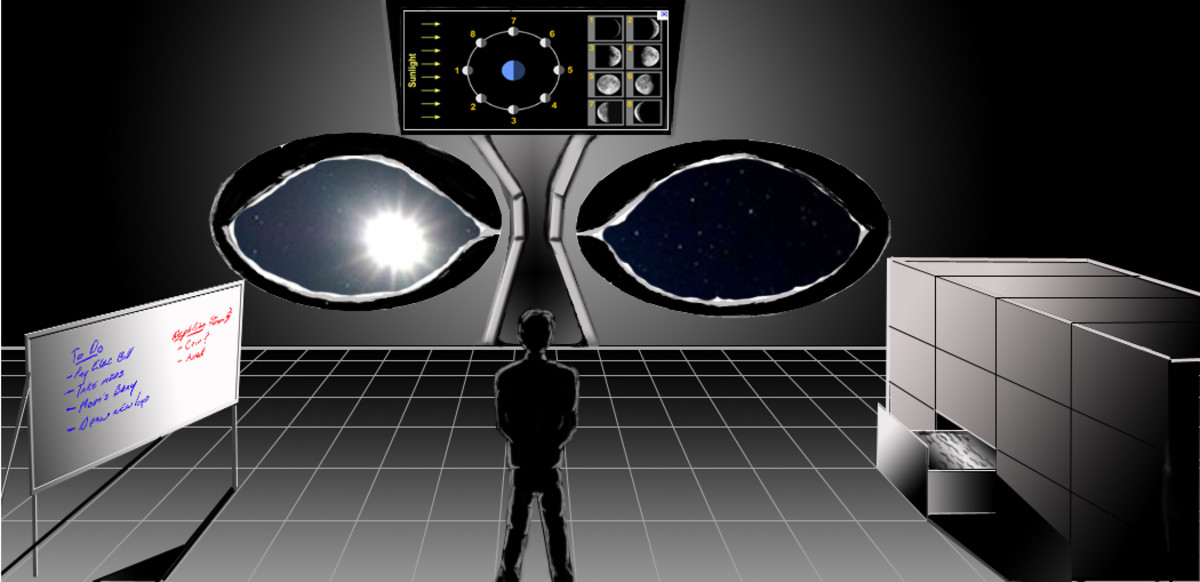
The human mind is often said to be the final frontier in our strive to understand the universe and our place in it. In this modern age we have found monumental success through scientific discovery in achieving a better understanding of the nature of matter, energy, and the natural laws that govern them, but these same methods and practices haven't been nearly as successful where the conscious human mind is concerned.
When speaking of inanimate matter and its behavior, we can reach certain concrete conclusions through a better understanding of the nature of matter and of the conditions of the environment that affect its behavior. Animate matter, however, is a bit different. Biologically and chemically we can apply the same methods and can often reach the same kinds of concrete conclusions. Where the waters get a bit murky is in determining what causes animate matter to behave the way it does. What animates animate matter?
Inanimate matter just does what it does. A rock rolling down a hill is only affected by the laws of nature and the other objects it comes in contact with, but there's no willful action taken by the rock to in any way alter the outcome. But animate matter, living organisms, do exhibit behaviors, and often act, whether it be in response to external stimuli or whether it be initiated by the organism itself, in very distinct ways that differentiate it from inanimate materials.
The conscious mind is ultimately the product of the evolution of life. Where our understanding of inanimate matter and energy enables us to reconstruct a chain of causation all the way back to the very beginning that explains how and why this universe and this planet came to be as it is today, that is not the case with life. We can see through fossil evidence that it evolved and developed in variation and complexity over the course of countless generations that ultimately led to human beings with human minds, but we don't have the same level of understanding of the nature of life itself to clearly understand what causes it to behave in the way it does that propelled it to become what it has become.
To better understand the human mind I feel it's important to look at the whole picture. And that picture begins with a look at the still very much mysterious phenomenon that somehow sprang up one day in the primordial pool of this inanimate Earth and eventually evolved into intelligent beings aware of, and compelled to understand, themselves.... Life.
Life
Life, as defined by the American Heritage Dictionary:
"The property or quality that distinguishes living organisms from dead organisms and inanimate matter, manifested in functions such as metabolism, growth, reproduction, and response to stimuli or adaptation to the environment originating from within the organism."
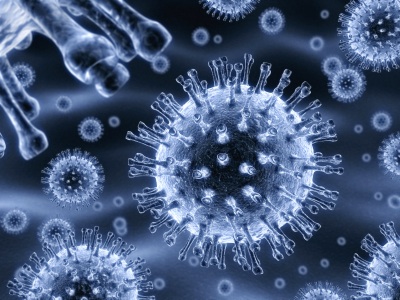
The phenomenon of life has been notoriously difficult to define in any sort of conceptual way. In and of itself, life cannot be detected or measured. At the molecular level there is no difference between living and dead organic matter. The only indicators that life is present in an organism is if that organism exhibits all, or most, of the following biological functions:
Homeostasis - Regulation of the internal environment to maintain a constant state.
Organization - Being structurally composed of one or more cells, which are the basic units of life.
Metabolism - Transformation of energy by converting chemicals and energy into cellular components (anabolism) and decomposing organic matter (catabolism).
Growth - Maintenance of a higher rate of anabolism than catabolism.
Adaptation - The ability to change over time in response to the environment.
Response to Stimuli - A response can take many forms, from the contraction of a unicellular organism to external chemicals, to complex reactions involving all the senses of multicellular organisms.
Reproduction - The ability to produce new individual organisms, either asexually from a single parent organism, or sexually from two parent organisms.
When an organism is alive, every fiber of that organism exhibits behavior that serves the purpose of sustaining and/or perpetuating life. From simple single-celled organisms like bacteria and archaea and non-cellular organisms like viruses, to complex multi-celled organisms like plants and animals, to every individual cell that plants and animals are made up of, the behavioral traits that indicate the presence of life are consistent and absolute.
Death is the absence of life. When an organism dies all of its biological material ceases to function. In the same way that electronic components are stagnant and 'lifeless' without the presence of an electrical current, biological matter is stagnant without the presence of life. Death, like life, lacks any real conceptual definition as little consensus can be reached as to what either state really is. Any attempt to do so becomes decidedly religious or philosophical because it lies somewhere beyond current scientific explanation.
When life is present, organic matter instinctively behaves as if it has a will that drives it to live. It's motivated, compelled, to maintain a physical state that's conducive to life. A will manifested in those observable functions. Obviously, these are not willful acts of volition as this instinctive behavior exists in the simplest of organisms. Life is a driving force that originates from within the organism, yet is not the conscious choice of the organism.
Nowhere is this more apparent than in humans, who have the most pronounced cognitive will of all the animal kingdom. Unlike any other species, humans have the self-awareness to observe themselves, and the reason to determine whether or not to alter behavior based on those observations. Animals are capable of change, but only in response to external conditions or stimuli. Their behavior is purely instinctual. Instincts that serve the same ultimate purpose as the biological functions that signify life. Survival.
Because of humanity's unique self-awareness, our capability to remember the past, imagine possible futures, and apply reason to scale our actions towards a preferred result, it is said that we have free will. A uniquely human quality that results in a myriad of uniquely human behaviors that range from inventing tools and creating civilizations to waging wars and inflicting harm, not just on others, but often on our own selves. Where animal behavior is always for the purpose to survive or protect, humans often behave in ways that are counter-intuitive to natural instinct.
Whatever life is, whatever will it imbues living tissue with, the conscious mind is not aware of it or in control of it, even though the conscious mind is a product of the very same brain that controls the biological functions of the body. Whatever the conscious mind is, it too springs from the well of life. Life has consistently proven to be a blind-spot in an otherwise very exact scientific understanding of the natural world. How it began is unknown. What role it played throughout the evolutionary progression of life is barely understood considering random mutation is the best explanation we can currently imagine, and the conscious human mind remains just as mysterious as ever no matter how deep we plum the depths of the physical brain.
We, as self-aware beings, enter life completely unaware of the instinctual behaviors programmed into our physical bodies through countless generations of evolution. We are initially only aware of the world around us, then we become aware of ourselves, then aware of ourselves in relation to the world around us. But we do not see ourselves as large colonies of cells. We see ourselves as one whole individual being. The functions of the body are a mystery to us that must be learned.
This separation of bodily instinct and the conscious mind is maybe better understood through examining the evolutionary progression of the vertebrate brain.
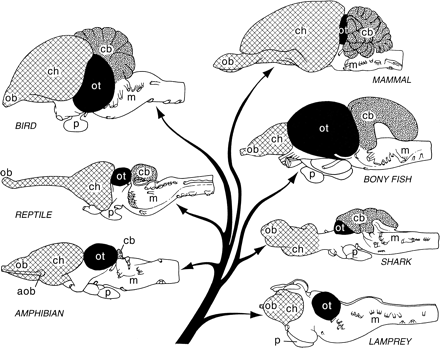
The Human Brain: The body's most complex mechanism
Every organ of the body is a mechanism that performs specific tasks. Though the brain is infinitely more complex than any other organ, ultimately it is nothing more than a mechanism as well.
While there are significant differences in overall size, as well as relative size of each component, the basic components of the brain are the same for nearly all vertebrates. It can be seen by observing the brains of vertebrates along the evolutionary scale that the brain's progression developed from the brain stem out.
The Brain Stem
The brain stem is at the base of the brain and connects directly to the top of the spinal chord. In vertebrates on the lower end of the evolutionary scale, like amphibians and reptiles, the brain stem makes up the majority of the brain's total mass. The human brain stem, which resembles the brain of a reptile, is responsible for the basic vital functions of the body like heart rate, blood pressure, and breathing.
The Cerebellum
Jawless-fish that show up early on the evolutionary scale, like lamprey, do not have a cerebellum. It's believed that the appearance of the cerebellum in jawed-fish is related to improved locomotion and evolved feeding methods. The cerebellum branches off the back side of the brain stem, and it's associated with motor functions like balance, coordination of movement, and posture.
Evolution of the Vertebrate Forebrain
The human forebrain consists of the Basal ganglia, the Limbic System, and the Cerebral Neocortex, and it blossoms out of the end of the spinal chord. Though it's since proven to be a bit too simplistic, the Triune Brain Model is still used today as a way to categorize sections of the vertebrate forebrain and how they associate to the evolution of reptiles, early mammals, and late mammals. Though the dividing lines aren't quite as clear as when the model was first introduced, they do show a correlation between specific functions and what vertebrates along the evolutionary scale the emergence of these functions are associated with.
The Reptilian complex (Basal ganglia) - It's believed that the Basal ganglia, at the base of the forebrain, is primarily involved in action selection. It's associated with voluntary motor control, the learning of habitual routines and behaviors, eye movement, and cognitive emotional functions. The Reptilian complex is often thought to be responsible for traits that first came about in reptiles, like territoriality and ritual behavior.
The Paleomammalian complex - This complex is made up of a set of interconnected structures known together as the limbic system. These structures are associated with emotion, behavior, motivation, long-term memory, olfaction, and is highly interconnected with the brain's pleasure center (nucleus accumbens). It's the limbic system that is considered responsible for social behaviors, nurturing behaviors, and reciprocal relationship behaviors associated less with reptiles and more with early mammals.
The Neomammalian complex (neocortex) - The neocortex is a cluster of structures that sit on top of, and wrap all around, the limbic system, and the functions attributed to it are the more advanced traits predominantly found in later mammals. More on the neocortex below.
The Cerebrum
The cerebrum is responsible for higher brain functions like thought, memory, and movement, and is the largest part of the human brain.
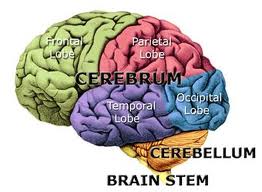
The Cerebrum, or Cerebral Cortex, is made up of multiple lobes that each perform particular functions. The frontal lobes are associated with things like speech, abstract thought, emotion, movement, and learning, sensory information like touch and pain are handled by the parietal lobes, vision by the occipital lobes, and hearing and memory by the temporal lobes. The Cerebrum is actually two nearly identical halves, or hemispheres, split right down the middle and linked together only by the corpus callosum, through which the two sides communicate and coordinate.
The traits that make humans most unique are attributed to the most recently evolved portions of the brain. The neocortex is the six outer layers of the cerebrum and is only found in mammals. In humans it makes up 90% of the cerebral cortex and is responsible for enhanced cognitive capabilities like spatial reasoning, sensory perception, generation of motor commands, language, and conscious thought.
Separation of Body and Mind
So it can maybe be better understood how the instinctual behaviors of the body can be so separated from, and unknown by, the conscious mind. The conscious mind uses sensory information gained during life, images, sounds, numbers, words, feelings, memories, associations, to perform its functions. Its entire concept of reality is based on information gathered by the body's senses through life experience.
The portions of the brain attributed to vital functionality evolved much earlier and are engrained. Consciously cut yourself and the body will heal itself. Consciously hold your breath and the body will eventually force you to breathe. The body sweats, sneezes, coughs, vomits, gags, flinches, and shutters to survive. Even if a person consciously does not, the body wants to live.
Multiple components of the physical brain each handle specific functions that are seamlessly integrated into one cohesive experience. The conscious experience through which we interact with reality is a product of numerous components that work in unison to make up an intangible, undetectable, unobservable, metaphysical whole that seems greater than the sum of its mechanical parts.
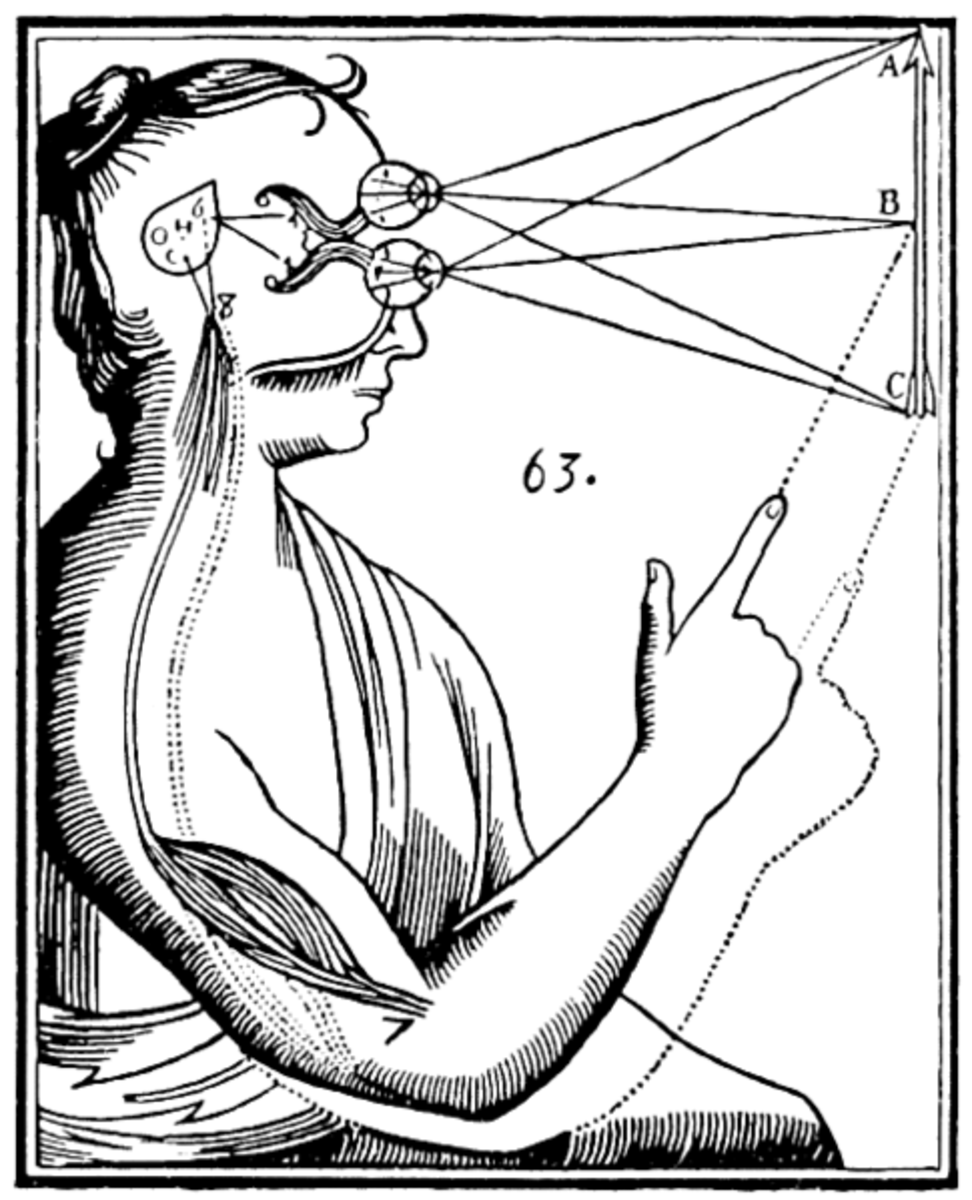
The Human Mind: Invisible and Undetectable
"Anything that we are aware of at a given moment forms part of our consciousness, making conscious experience at once the most familiar and most mysterious aspect of our lives." -The Blackwell Companion to Consciousness by Max Velmans and Susan Schneider
We humans experience life through our conscious minds. When we're conscious we're aware. Aware of the world around us, aware of our physical selves, and aware of our thoughts.
Despite modern advances in technology and an abundance of new information learned through observing and studying the inner workings of a functioning human brain, the debate whether or not the mind is nothing more than the product of the physical brain is still very much unresolved. It's an age-old debate ongoing since the days of Socrates, Plato, and Aristotle. A debate known in Philosophy as the Mind-Body Problem. Basically, how can something nonphysical, like thoughts, interface with and have an effect on something physical, like a body, and vise versa.
The body is a stranger to us when we're first born. We get to know it throughout life. We learn how it works, how to take care of it, how to deal with all its functions and particularities. From our mind's perspective the body is a separate entity just as strange and foreign as everything else in the external world. We often make the distinction in how we speak of them, separating mind and body. It's this perception that leads many to believe they are in fact two distinct entities. This view is known as dualism.
Then there are others who think that perception of mind/body separation is just an illusion, and that the mind is the product of the functions of the physical brain in a physical body and nothing more. Because our mind's perception of the external world (including our own bodies) is built through information picked up by the senses through life experience, this makes it seem as if the mind and body are two separate things, when in fact they are one and the same. This view is known as monism.
The problem is that the mind cannot be observed. As it was detailed above in the associations that have been drawn between particular functions and components of the brain, there's quite a lot that can be learned by observing the brain. However, those associations have to be drawn through observing the actions of the subject. The output. What they say or what they do.
For example, say you ask 50 subjects to think about things that make them happy and ask another 50 to think about things that make them mad, all while recording the inner workings of the brains of each as they are doing so. Though you can draw conclusions by comparing the differences and similarities of the physical happenings of each subject's brain compared to one another, you still are left just having to take their word for it that they were in fact thinking about what you asked them to think about. There's no way to observe and confirm the thoughts of the subject to determine with objective certainty what was actually happening in their minds.
It is because of this inability to observe the mind that the fields of study involving the mind, and all things born of the mind, fall primarily in the category of the Social Sciences (psychology, anthropology, sociology) and not the Physical Sciences. This is because studies of the mind cannot be totally objective. They require a level of subjectivity. In other words, the observer must rely, at least to some degree, on relating the observed functions of a subject's mind to their own mind experience.
The Id and the Ego
In the field of Psychology, Sigmund Freud proposed a division within the mind between conscious thought and instinctual behavior, much like what was discussed above. Where instinctual bodily behaviors like sweating or blinking can happen with no conscious effort, there are other instinctual bodily behaviors that do require a level of participation on the part of the conscious mind to accomplish, such as eating, disposing of waste, or mating, for example. The body and mind must work together to decide how best to accomplish these functions, or decide whether or not to do so in those cases where that is an option. Freud described this process as the interplay between what he called the Id and the Ego.
The Id is described as the part of the human psyche that's concerned with basic, instinctual drives. Freud saw the Id as being closely tied to what he called the "pleasure principal", that part of us that seeks to avoid pain or unpleasant sensations, like hunger or the tension brought about through the wants of the libido. The Id has no organization, it just wants immediate gratification, much like we all were at one time as infants, unable to articulate our needs and not yet aware or capable of how to attain them ourselves.
The Ego is primarily the conscious self and is more concerned with the "reality principal", looking to appease the desires of the Id in some realistic way that will not ultimately bring about displeasure or grief in the future. Freud described the Ego as the mediator between the Id and reality. Where the Id is what's inherited and present at birth in the mind, the ego is developed through life experience. It's the organized part of the personality that regulates behavior through remembering past experiences, imagining potential outcomes, and deciding the best course of action.
Freud later added a third division of the psyche that he dubbed the Super-Ego, which he associated with our conscience and morality, made up of the influential personalities or entities chosen throughout life as ideal models. Freud saw the anxieties of the mind as being created by the interplay between these divisions when the Ego struggles to find balance between the Id, the Super-Ego, and the external world.
So, much like what can be seen through the studies of the physical brain and the functions that developed throughout its evolution, here too a duality can be, not necessarily seen but deciphered, between the instinctual needs of the body and the desires of the conscious mind. Most of which only seems to address behaviors not solely attributed to humans, but could also apply just as well to the majority of the later-evolved mammals. But are the human qualities that distinguish us so considerably from the animal kingdom attributed solely to our more evolved physical brains and its capability to better imagine and conceptualize? Or is there something more to it than that?
The Human Will: The Most Creative/Destructive Force in Nature
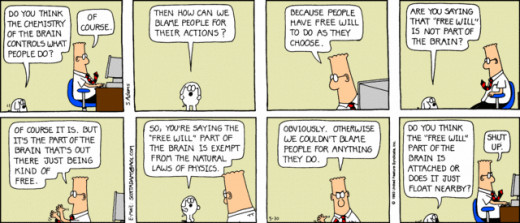
“It is certainly not the least charm of a theory that it is refutable; it is precisely thereby that it attracts the more subtle minds. It seems that the hundred-times-refuted theory of the "free will" owes its persistence to this charm alone; some one is always appearing who feels himself strong enough to refute it.”
― Friedrich Nietzsche
As if the task of understanding the human mind weren't difficult enough, here we find ourselves facing yet another pesky philosophical conundrum. Much like the mind-body problem, whether or not humans have free will is also an age-old debate yet to be resolved. Free Will or Determinism? And to confuse matters even further, discussions on the topic often spend as much effort in debating differing definitions of terms as they do discussing the merits of each view. This in itself illustrates that we're dealing with a topic ungrounded by observable, quantifiable facts, and instead discussed in abstract philosophical rhetoric.
Determinism is the idea that human behavior is nothing more than a product of the physical brain, and eventually human behavior could be just as predictable as anything else found in nature if all the parameters and deciding factors that play a role in decision making are known and understood.
"One may put the Deterministic position in a few words. Essentially it is a thorough-going application of the principle of causation to human nature. What Copernicus and Kepler did for the world of astronomy, Determinism aims at doing for the world of psychological phenomena. Human nature, it asserts, is part and parcel of nature as a whole, and bears to it the same relation that a part does to the whole. When the Determinist refers to the "Order of Nature" he includes all, and asserts that an accurate analysis of human nature will be found to exemplify the same principle of causation that is seen to obtain elsewhere. True, mental phenomena have laws of their own, as chemistry and biology have their own peculiar laws, but these are additional, not contradictory to other natural laws. Any exception to this is apparent, not real. Man's nature, physical, biological, psychological, and sociological, is to be studied as we study other natural phenomena, and the closer our study the clearer the recognition that its manifestations are dependent upon processes with which no one dreams of associating the conception of "freedom". Determinism asserts that if we knew the quality and inclination of all the forces bearing upon human nature, in the same way that we know the forces determining the motions of a planet, then the forecasting of conduct would become a mere problem in moral mathematics." - Chapman Cohen, Determinism or Free Will?
Proponents of both views agree that humans are self-aware, are able to remember and learn from the past, are able to imagine possible futures, and are able to apply reason and choose a course of action in a given situation. Where they differ is whether or not a different choice was actually possible. After all, time is linear and each decision is made in a unique situation that will never again be exactly the same. Whether or not a different choice could have actually been made in the moment in which it was made is merely speculation. To the Determinist the choice was made in the only way it could have, and all other competing choices considered in making the choice only make it seem as if there were other possibilities that we willfully chose not to pursue.
It's understandable how this debate can have such longevity. Our self-aware perspective as a reasoning individual contemplating actions and choices naturally makes it seem as if we're in control, yet there is this logically sound philosophical rebuttal that cannot be objectively proven wrong. Unless science someday proves able to quantify every factor in play and accurately predict with exact precision future human behavior, this debate will undoubtedly carry on perpetually from one generation to the next throughout the remainder of human existence.
However, the pursuit to someday reach an exact calculable equation capable of predicting the behavior of literally everything in the material world, including human behavior, may prove unattainable whether human behavior is strictly a material function or not. In Quantum Physics matter and energy are studied at the subatomic level. At that level what's been found is that there is an inherent level of uncertainty that cannot and will not ever be calculable to the exacting degree most certainly required to accurately predict all future behavior. This is not a limitation of technological capability or due to any as of yet undiscovered law of physics, it's simply a fundamental property of quantum systems known as the Uncertainty Principle. In other words, at the subatomic level of the particles that make up the elements that make up our biological brains there is a certain degree of uncertainty, or "chance".
So, if both sides of the Free Will versus Determinism debate agree on the process by which decisions are made, and if neither perspective can ever really be proven, what does it matter? Well, ultimately it all comes down to accountability of our actions. We are certainly held accountable for our actions, and hold others accountable as well. Proponents of free will, sometimes called Volitionists, say that without free will there is no accountability. The Determinist argues it's not a matter of accountability, but rather an acknowledgment that external social factors throughout life experience play a significant role in human behavior that through Determinism can be studied and understood, allowing us to then properly address unfavorable behavior in a more constructive way than punishment as a scare tactic or for retribution. They argue that holding onto the concept of free will obstructs our progress to a better end. Then again, that whole concept in itself suggests having a level of control in how we move forward. See how complicated it can get?
On the Evolution of the Human Mind and the Origin of Free Will: Part 2
- On The Evolution of the Human Mind and the Origin of Free Will: Part 2
Part 2 seeks to understand the emergence of the modern human mind by examining changes in behavior throughout human history, where and when they happened, and what the people at the dawn of the written age had to say.





